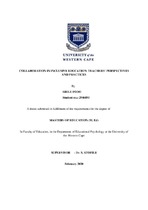| dc.description.abstract | Inclusive education (IE) is an international movement and South Africa is in the process of developing systems to support the process. The aim of this study was to develop narratives of teachers’ trajectories of collaboration in developing IE. The Department of Education acknowledged that collaboration between teachers and other professionals and between teachers and parents and the community at large is a critical strategy and skill for developing IE successfully (Department of Education, 2001). This study was conducted at a full-service school in the Western Cape Province which was selected purposively. Snowball sampling was used to select six teachers who were interviewed and observed in their collaborative spaces. This study used a qualitative approach and a case-study approach as a research design. It used Cultural-Historical Activity Theory (CHAT) as the theoretical framework to understand how teachers respond to the diverse needs of all learners and how they collaborate with others in developing more responsive pedagogies. Multiple methods of data analysis, such as thematic analysis and CHAT, were used to analyze data collected. The study revealed that teachers collaborated in school-initiated collaboration practices as well as in Department owned collaboration practices. Teachers reported to have voluntarily participated in school-initiated collaboration practices as their school had a culture of sharing knowledge and skills and this enabled them to work closely with each other, whereas in Department owned collaboration practices teacher reported that they participated because they had to obey instructions from their employee. Teachers felt that the Department owned collaboration practices used top-down approaches which hindered some of their collaboration practices. Teachers reported to have encountered some benefits from as well as barriers to collaboration. This study concludes that if collaboration is a critical strategy for the successful implementation of IE in South Africa, the Department of Education (DoE) should give schools an opportunity to indicate their areas of need so that they can be trained accordingly. Secondly, the DoE should continuously provide training for teachers on collaboration. Lastly, the DoE and the school should encourage and monitor teachers to continue to create environments where they work collaboratively in decision-making and problem-solving. | en_US |

